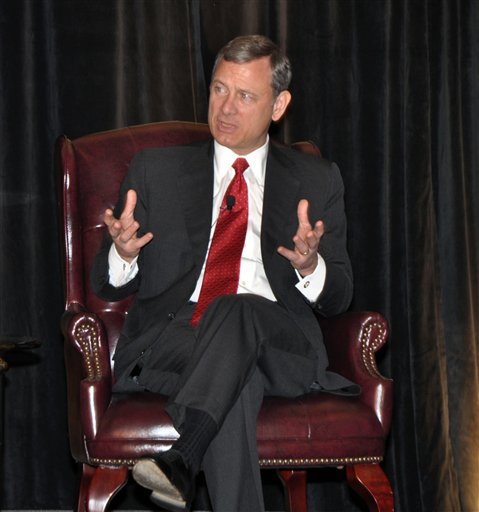FARMINGTON, Pa. — U.S. Supreme Court Chief Justice John Roberts joked that he’ll spend some time on an “impregnable island fortress” now that the court has ended a session that featured him casting the decisive vote to uphold President Barack Obama’s health care law.
Responding to a question about his summer break, Roberts said he planned to teach a class for two weeks in Malta, the Mediterranean island nation.
“Malta, as you know, is an impregnable island fortress. It seemed like a good idea,” Roberts said, drawing laughter from about 300 judges, attorneys and others attending a four-day conference today at a posh southwestern Pennsylvania resort.
Roberts appeared at a conference hosted by the Judicial Conference of the District of Columbia Circuit, one day after the Supreme Court said the federal government can require citizens to buy health insurance. The impromptu 35-minute session featured Roberts answering alternating questions from Chief Judge David B. Sentelle, of the D.C. Circuit Court, and Chief Judge Royce C. Lamberth, who heads the U.S. District Court for the District of Columbia.
Neither judge asked Roberts directly about the health care decision.
Rather, Roberts responded with the Malta quip after Sentelle asked him whether he was “going to Disney World” now that the court has adjourned for the summer.
The only direct question Roberts got about the health care opinion came when those at the conference were invited to ask questions.
That’s when Roberts was asked what he thought his court’s legacy would be in 50 years and “how one recent opinion might fit into that” — an obvious reference to the health care decision.
“Well, I won’t answer anything that has to do with the second part of that,” Roberts said. But he said he hopes that the court under him is remembered as one that “did our job according to the Constitution, of protecting equal justice under the law.”
Lamberth hinted at the controversial decision when he asked Roberts if it bothered him that he can’t respond to his critics.
“No,” Roberts said, his brief answer hanging in the air to more laughter.
The conference at Nemacolin Woodlands Resort and Spa, about 50 miles southeast of Pittsburgh, was entitled “Science and the Law.” It focused on how social sciences and psychology affect the way the courts are perceived by the public, as well as how judges go about making decisions when such sciences come into play.
Roberts wasn’t asked about those subjects. Instead, he answered more than a dozen questions ranging from how he decides to assign cases to his colleagues to whether social media activity is a problem among Supreme Court law clerks.
“The flat rule is ‘don’t do it,’ but we haven’t had any situations come up,” Roberts said.
Send questions/comments to the editors.



Success. Please wait for the page to reload. If the page does not reload within 5 seconds, please refresh the page.
Enter your email and password to access comments.
Hi, to comment on stories you must . This profile is in addition to your subscription and website login.
Already have a commenting profile? .
Invalid username/password.
Please check your email to confirm and complete your registration.
Only subscribers are eligible to post comments. Please subscribe or login first for digital access. Here’s why.
Use the form below to reset your password. When you've submitted your account email, we will send an email with a reset code.